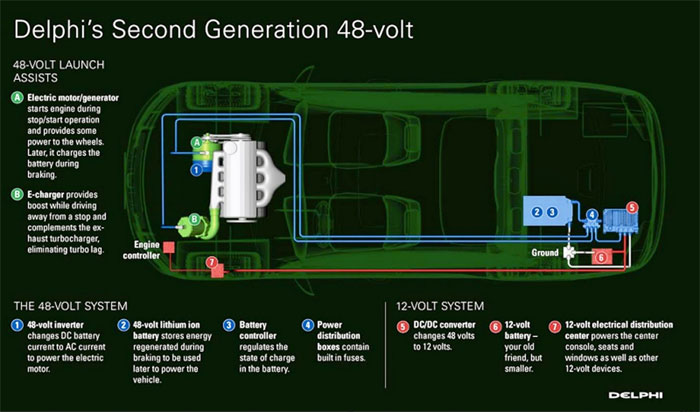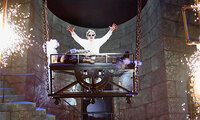Great quote at the end.
When I started in mechanics the generator was being phased out for the alternator. Looks like the generator may be coming back
if the article is correct.
Source:
MidEngineCorvetteForum.com
Last week we all became aware of the reports that the C8 Corvette is being delayed over electrical problems and while we didn’t want to believe it at first, it does appear that something is amiss with the new Corvette’s electrical system.
I’m no electrical engineer and we have no information on the type of the electrical system in the new Mid-Engine Corvette, but lucky for us we have friends on the MidEngineCorvetteForum.com who have been digging into this issue and have come up with some fascinating information about modern-day automotive electrical systems.
Since the 1950s most vehicles have operated with a 12V electrical system and battery which provided plenty of starting power for most vehicles. Today’s vehicles are more power-hungry and “more juice” is needed to start and run the new electronic systems as manufacturers have replaced previous mechanical-driven components with more efficient electrical-powered components including power steering racks, electric brake vacuum pumps and electric water pumps to name a few. Then you have all the new infotainment options as well as creature comforts like heated or cooled seats, lane departure warnings, and even adaptive cruise control systems that need to be powered as well, and you can see how a 12-volt system could be in danger of being maxed out.
The alternative to the 12V system that most automakers are going with are 48V systems which provide more than enough electrical power through the system. Not only does a 48V system have the juice to handle the new electronics, but they can also offer the ability for more performance and fuel economy savings. In fact, 48V systems are described as “mild hybrids” because the alternator is replaced with an electric generator to provide the additional electrical power. As more of the mechanical components can be converted to electric systems, that means less parasitic power loss to engines which improves fuel economy, reduces emissions and increases power.
One article we read touts Audi as using a 48V system in conjunction with an electrically powered supercharger which boosts power at low engine speeds without the lag of an exhaust-driven turbo is known for, while a lithium-ion battery in the trunk recaptures energy from regenerative braking. When the ZR1 first came out, we learned the massive supercharger draws about 100 horsepower from the engine. Think about the power that could be gained if more mechanical systems could be off-loaded to an electrical power system.
Delphi is one of the leading providers of 48V systems and here is a great graphic that shows more about a 48-volt electrical system.
Another aspect of what Corvette engineers are dealing with may have to do with the higher performance models. The rumors of the C8 Corvette have been pretty strong that a hybrid “E-Ray Corvette” that makes upwards of 1,000 hp through a combination of an internal combustion engine and electric motors on the wheels. We’ve also seen some recent patents like this control system for active aerodynamics that are rumored for the C8 as well. Obviously, a system like that would need a much more robust electrical system to handle those electrical loads.
So going back to the Corvette’s electrical woes, we can imagine several scenarios where either they went with the 12V system similar to the C7s for cost savings and they are finding it’s just not enough power, or they went with the 48V system and are having some growing pains in getting all the systems to work correctly. A third option might be a hybrid 12V/48V system that divides the system for lights and vehicle starting vs everything else. As Corvette is the “technological tip of the spear” for GM, it seems unlikely that engineers would go with any system that isn’t state of the art.
I guess what really gets my goat in the electrical delay story are the comments that say Chevy engineers are morons who don’t know what they are doing when in fact what they are doing is probably so much more.
When the story of the delay got out there, Paul Koerner, a GM World-Class Technician at Jackson Chevrolet in Connecticut left us this comment and we are wrapping up this article with his words:
Regardless of what people think they know or do not, the following holds true. Global B electronics architecture is a very amazing system and it has had growing pains in other motor vehicle manufacturer lines and this is why preproduction testing is so critical and why we have seen vehicles in Colorado, Florida and overseas. Multiple conditions and usages, my advise is: Be patient and short cuts are not part of Corvette engineering.
Great advice Paul!
When I started in mechanics the generator was being phased out for the alternator. Looks like the generator may be coming back
if the article is correct.
Source:
MidEngineCorvetteForum.com
Last week we all became aware of the reports that the C8 Corvette is being delayed over electrical problems and while we didn’t want to believe it at first, it does appear that something is amiss with the new Corvette’s electrical system.
I’m no electrical engineer and we have no information on the type of the electrical system in the new Mid-Engine Corvette, but lucky for us we have friends on the MidEngineCorvetteForum.com who have been digging into this issue and have come up with some fascinating information about modern-day automotive electrical systems.
Since the 1950s most vehicles have operated with a 12V electrical system and battery which provided plenty of starting power for most vehicles. Today’s vehicles are more power-hungry and “more juice” is needed to start and run the new electronic systems as manufacturers have replaced previous mechanical-driven components with more efficient electrical-powered components including power steering racks, electric brake vacuum pumps and electric water pumps to name a few. Then you have all the new infotainment options as well as creature comforts like heated or cooled seats, lane departure warnings, and even adaptive cruise control systems that need to be powered as well, and you can see how a 12-volt system could be in danger of being maxed out.
The alternative to the 12V system that most automakers are going with are 48V systems which provide more than enough electrical power through the system. Not only does a 48V system have the juice to handle the new electronics, but they can also offer the ability for more performance and fuel economy savings. In fact, 48V systems are described as “mild hybrids” because the alternator is replaced with an electric generator to provide the additional electrical power. As more of the mechanical components can be converted to electric systems, that means less parasitic power loss to engines which improves fuel economy, reduces emissions and increases power.
One article we read touts Audi as using a 48V system in conjunction with an electrically powered supercharger which boosts power at low engine speeds without the lag of an exhaust-driven turbo is known for, while a lithium-ion battery in the trunk recaptures energy from regenerative braking. When the ZR1 first came out, we learned the massive supercharger draws about 100 horsepower from the engine. Think about the power that could be gained if more mechanical systems could be off-loaded to an electrical power system.
Delphi is one of the leading providers of 48V systems and here is a great graphic that shows more about a 48-volt electrical system.
Another aspect of what Corvette engineers are dealing with may have to do with the higher performance models. The rumors of the C8 Corvette have been pretty strong that a hybrid “E-Ray Corvette” that makes upwards of 1,000 hp through a combination of an internal combustion engine and electric motors on the wheels. We’ve also seen some recent patents like this control system for active aerodynamics that are rumored for the C8 as well. Obviously, a system like that would need a much more robust electrical system to handle those electrical loads.
So going back to the Corvette’s electrical woes, we can imagine several scenarios where either they went with the 12V system similar to the C7s for cost savings and they are finding it’s just not enough power, or they went with the 48V system and are having some growing pains in getting all the systems to work correctly. A third option might be a hybrid 12V/48V system that divides the system for lights and vehicle starting vs everything else. As Corvette is the “technological tip of the spear” for GM, it seems unlikely that engineers would go with any system that isn’t state of the art.
I guess what really gets my goat in the electrical delay story are the comments that say Chevy engineers are morons who don’t know what they are doing when in fact what they are doing is probably so much more.
When the story of the delay got out there, Paul Koerner, a GM World-Class Technician at Jackson Chevrolet in Connecticut left us this comment and we are wrapping up this article with his words:
Regardless of what people think they know or do not, the following holds true. Global B electronics architecture is a very amazing system and it has had growing pains in other motor vehicle manufacturer lines and this is why preproduction testing is so critical and why we have seen vehicles in Colorado, Florida and overseas. Multiple conditions and usages, my advise is: Be patient and short cuts are not part of Corvette engineering.
Great advice Paul!



 .... But I do know what you're saying Richard.
.... But I do know what you're saying Richard.